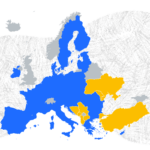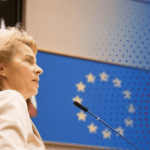
On 4 November, the European Commission adopted its annual Enlargement Package, which presents a comprehensive assessment of the progress made by the enlargement partners over the last twelve months. This year’s package reaffirms that the momentum of enlargement is high on the EU’s agenda of priorities. It also confirms that the accession of new Member States is increasingly within reach.
Maintaining coherence and following a merit-based approach is the key to successful EU accession. Montenegro, Albania, Ukraine, the Republic of Moldova, Serbia, North Macedonia, Bosnia and Herzegovina, Kosovo, Turkey and Georgia are pursuing their respective paths towards the EU. The pace of their reforms, particularly in the areas of democracy, the rule of law and fundamental rights, has a direct bearing on the speed of accession. These developments benefit both the aspirant states and the current EU Member States by fostering prosperity, democracy, security and stability, while opening up new opportunities for citizens and businesses, such as strategic investments and the opening of the single market.
European Commission President Ursula von der Leyen said: “We are more committed than ever to making EU enlargement a reality. Because a bigger Union means a stronger and more influential Europe on the world stage. But enlargement is a merit-based process. Our package offers specific recommendations to all our partners. And to all of them we say EU membership is a unique offer. A promise of peace, prosperity and solidarity. With the right reforms and strong political will, our partners can seize this opportunity”
The assessments, accompanied by recommendations and guidance on reform priorities, provide enlargement partners with a roadmap towards EU membership. The Commission remains fully committed to supporting future Member States on this journey. The gradual integration of aspiring members into the single market strengthens links with the Union already before their accession. Significant progress has been made in the past year. With enlargement as a clear policy objective in this mandate, the Commission is committed to ensuring both the readiness of aspiring members and the preparedness of the EU to welcome them. To this end, a Communication on in-depth policy reviews and reforms will be presented shortly.
To ensure that the new Member States continue to safeguard and maintain their record on the rule of law, democracy and fundamental rights, future Accession Treaties will need to contain stronger safeguards against breaches of commitments made during the accession negotiations.
Effective communication, as well as the fight against manipulation of information and foreign interference, including disinformation, is a strategic imperative.
The Commission also stands ready to support Member States’ efforts to further strengthen public confidence in the process and to help enlargement move forward with the legitimacy it needs.
Main conclusions
Montenegro has made significant progress towards EU accession, closing four negotiating chapters in the last year. Montenegro’s commitment to provisionally close further chapters by the end of 2025 reflects its dedication to European integration. Maintaining steady progress on reforms and the continued search for a broad political consensus are crucial to achieving the country’s goal of closing accession negotiations by the end of 2026. Provided it keeps up the pace of reforms, Montenegro is on track to achieve this ambitious goal.
Albania has made significant progress, with the opening of four clusters in the last year. Preparations for the opening of the last cluster this year are well advanced. Progress has been made on key issues, notably on justice reform and the fight against organised crime and corruption. Further efforts are now needed to meet the intermediate benchmarks under the key issues, which will pave the way to start closing the negotiating chapters once the necessary sectoral reforms have been completed. Achieving Albania’s objective of concluding negotiations by 2027 depends on maintaining the momentum of reforms and fostering an inclusive political dialogue. Provided it maintains the pace of reforms, Albania is on track to achieve this ambitious goal.
Despite Russia’s relentless war of aggression, Ukraine remains firmly committed to its EU accession path, having successfully completed the screening process and advanced key reforms. Ukraine has adopted roadmaps on the rule of law, public administration and the functioning of democratic institutions, as well as an action plan on national minorities, which the Commission assessed positively. Ukraine has fulfilled the necessary conditions for opening groups: one (key issues), six (external relations) and two (internal market). The Commission expects Ukraine to meet the conditions for opening the remaining three groups and is working to ensure that the Council is in a position to take forward the opening of all groups before the end of the year. The Ukrainian government has indicated its objective to provisionally close accession negotiations by the end of 2028. The Commission is committed to supporting this ambitious goal, but considers that, to achieve it, the pace of reforms needs to be accelerated, in particular as regards the fundamentals, notably the rule of law.
In the face of continuing hybrid threats and attempts to destabilise the country, Moldova has made significant progress on its accession path, successfully completing the screening process. The first EU-Moldova summit in July 2025 marked a new stage of cooperation and integration. Moldova has adopted roadmaps on the rule of law, public administration and the functioning of democratic institutions, which the Commission assessed positively. The Commission’s assessment is that Moldova has fulfilled the necessary conditions for opening clusters one (key issues), six (external relations) and two (internal market). The Commission expects Moldova to meet also the conditions for opening the remaining three clusters and is working to ensure that the Council is in a position to take forward the opening of all clusters before the end of the year. The Moldovan government has indicated its objective to provisionally close accession negotiations in early 2028. The Commission is committed to supporting this ambitious but achievable target, provided Moldova accelerates the current pace of reforms. It is crucial to maintain the reform momentum, reinforced by strong parliamentary support for the country’s European path following the September elections.
The polarisation of Serbian society has been accentuated in the context of the mass protests that have taken place across the country since November 2024, reflecting citizens’ disappointment over, among other things, corruption and perceived lack of accountability and transparency, along with instances of excessive use of force against protesters and pressure on civil society. This has resulted in an increasingly difficult environment in which divisive rhetoric has led to a serious erosion of trust among stakeholders, which in turn impacts on the accession process. Reforms have slowed down considerably. While some recent progress is acknowledged, such as the relaunch of the selection procedure for the new Board of the Electronic Media Regulatory Authority (EMRA) and progress in the legislative process on the Law on a unified electoral roll, which now needs to be completed and implemented, as well as a recent increase in alignment with the EU’s Common Foreign and Security Policy, which needs to be continued, much remains to be done. Serbia is expected to overcome the stagnation in the area of the judiciary and fundamental rights in general and urgently reverse the backsliding on freedom of expression and the erosion of academic freedom. The Commission’s 2021 assessment that Serbia had met the openness benchmarks for group 3 (competitiveness and inclusive growth) remains valid.
North Macedonia continued its work on the roadmaps for the rule of law, public administration reform and the functioning of democratic institutions, as well as on the action plan for the protection of minorities. Further swift and decisive action is needed on the opening benchmarks, in line with the Negotiating Framework, with a view to opening the first group as soon as possible and when the relevant conditions are met. North Macedonia should intensify its efforts to uphold the rule of law, safeguarding judicial independence and integrity and strengthening the fight against corruption. The country should also adopt the necessary constitutional changes with a view to including in the Constitution citizens living within the state’s borders who are part of other peoples, such as Bulgarians, as outlined in the Council Conclusions of July 2022, which the country committed to implement and achieve.
In Bosnia and Herzegovina, the political crisis in the entity Republika Srpska and the end of the ruling coalition have undermined progress towards EU accession, resulting in limited reforms, notably on data protection and border control, as well as the signing of the Frontex status agreement. On a positive note, BiH submitted its reform agenda to the European Commission in September 2025. Following recent institutional changes in the entity Republika Srpska, Bosnia and Herzegovina has the opportunity to implement reforms on the EU path. To effectively start accession negotiations, the authorities must first finalise and adopt judicial reform laws, fully in line with European standards, and appoint a chief negotiator.
Kosovo has remained committed to the European track, with a high level of public support. The delay in the formation of institutions after the February general elections slowed progress on EU-related reform. Cross-party cooperation and reprioritisation of these reforms is necessary to get Kosovo back on track towards the EU. Normalisation of relations with Serbia and the implementation of the Dialogue commitments remain an integral part of Kosovo’s European perspective. The Commission is ready to prepare an opinion on Kosovo’s application for membership, if requested by the Council. The Commission has taken the first steps to gradually lift the measures against Kosovo in force since May 2025. The next steps remain conditional on sustained de-escalation in the north. The Commission intends to continue to lift these measures provided that an orderly transfer of local governance in the north is achieved after the second round of local elections and de-escalation is sustained.
Turkey remains a candidate country and a key partner for the EU. In line with the April 2024 European Council conclusions, the EU has taken forward relations with Turkey in a gradual, proportionate and reversible manner, focusing on shared priorities. The resumption of talks on the settlement of the Cyprus problem is a key element of cooperation. At the same time, increasing judicial actions against opposition figures and parties, along with multiple other arrests, raise serious concerns about Türkiye’s adherence to democratic values. While the rule of law dialogue remains central to EU-Turkey relations, the deterioration of democratic standards, judicial independence and fundamental rights has yet to be addressed. Accession negotiations with Türkiye have been stalled since 2018.
In 2024, the European Council concluded that Georgia’ s EU accession process was de facto stalled. Since then, the situation has deteriorated sharply, with a serious democratic backslide marked by a rapid erosion of the rule of law and severe restrictions on fundamental rights. This includes legislation that severely limits civic space, undermines freedom of expression and assembly and violates the principle of non-discrimination. The Georgian authorities must urgently reverse their democratic backsliding and undertake comprehensive and tangible efforts to address outstanding problems and key reforms, supported by cross-party cooperation and civic engagement, in line with EU values. Following the European Council Conclusions of December 2024 and in the light of Georgia’s continued backsliding, the Commission considers that Georgia is a candidate country in name only. The Georgian authorities must demonstrate their firm commitment to reversing course and returning to the path of EU membership.
Next steps
It is now up to the Council to consider today’s recommendations from the Commission and to take decisions on the next steps in the enlargement process.
Background
Enlargement is a strict, fair and merit-based process, based on objective progress in each enlargement country. The EU supports institution building, democratic governance and public administration reforms in all these countries.
By encouraging gradual integration, the EU brings benefits even before accession. Initiatives such as the ¤6 billion Growth Plan for the Western Balkans, the ¤1.9 billion Growth Plan for Moldova and the ¤50 billion Ukraine Facility allow the countries to advance their reforms, as well as to establish a stronger connection with the EU, for example through gradual integration and participation in SEPA and Roam Like at Home.
Each enlargement has made our Union stronger. When ten countries joined the EU in 2004, it was the biggest enlargement in the Union’s history. In the two decades since then, newcomers have seen living standards double, unemployment almost halve, life expectancy rise from 75 to 79 years, poverty and social exclusion fall dramatically and 6 million new jobs created. For current members, trade has increased more than fivefold since then, while 20 million jobs have been created. For the EU as a whole, the single market then gained 74 million new consumers and the EU economy has grown by 27% despite the global crises.
More information: European Commission






Leave a Reply